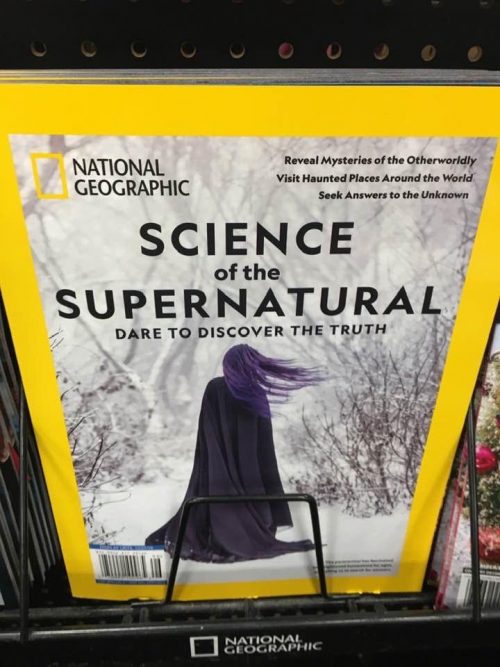The first stage was Scienceblogs, which was great, but was burning through the cash, so they sold the network. Now it’s been bought up by a right-wing astroturf organization which is using our old content to sell ads. We got out in time.
We bloggers moved out to a new site managed by National Geographic, which you’d think was a step up, but they had no clue what to do with us, skimped on maintenance, and started blathering about imposing restrictions on what we could post. That’s one of the reasons Ed and I started up Freethoughtblogs. Then they started publishing garbage to court the yahoo dollars. We got out in time, because hoo boy has Nat Geo flushed itself down the craphole.
Hey, remember that guy who was so concerned about how my profanity-laced diatribes
and lack of civil discourse about religion
was going to ruin the reputation of dignified, noble NatGeo? I wonder how he’s doing nowadays.



Is it better or worse since Murdoch sold it to Disney?
By the way I did a paper in college about US intervention in Haiti and The Nation spent a fair amount of column space ragging on the NG for it’s bad and unsupported coverage of the Haitian incursion. This would have been back in the 19 teens (when the intervention occurred, not when I wrote the paper).
Oh dear, oh dear, oh dear. But then most mainstream media these days is happy to constantly run stories on various aspiects of the “supernatural”.
Forget just religion, Hitch. Capitalism also ruins everything.
I call fake.
What’s supposedly fake, pyromorph?
@ PZ
Speaking of bloggery, I sent an email to “[email protected]”. Just mentioning it here because I’m not sure if anyone still checks that. The About page seems to be several years out of date.
It is out of date, and we got it. I may just have to fire up the review process again.
@7 PZ
Fair enough. Thanks.
If the “fake” comment was directed at the image of the National Geographic magazine, well, it’s on Amazon.
https://www.amazon.com/National-Geographic-Science-Supernatural-Editors/dp/1547849428
Woo.
ah yes, H2O solidified and precipitated upon deciduous, biologically evolved organisms. Soooo supernatural! /sarcasm
Fantasy fiction can maybe get away with this, maybe, but most of the visuals associated fantasy/magic are actually extremely physical. Stuff like skeletons, mist, robes, and fire. Because people used to think that fire was magic. So it makes sense for them to be correct in a fantasy story, right? No, it’s just lazy artists.
Or maybe the purple hair is the only thing in the picture that is supposed to evoke the supernatural? Explain that atheists! lol
In the wilderness, wind lashing purple hair, a berobed figure,
awaits the last coach.
:)
I don’t see the problem with that cover. “Science of the supernatural” is a perfectly legit name for some part of psychiatry and psychology. Ok, we can debate whether these are actual sciences, but so what
@14
Psychology is real science.
End of debate.
I have that special. Think of the cover as a sort of click bait. The contents are more on the line of a serious academic look at the subject.
“The science of bullshit” would have been edgier.
@17 Marcus Ranum
But then the readership would have expected an analysis of Trump quotations.
Interesting. I was reminded of “Spook”, by Mary Roach, which I think did something similar, in a pop-sci sort of way. She went to India to talk to someone researching reincarnation incidents, and to the University of Virginia Division of Perceptual Studies (studying so-called out of body experiences), and that one out-of-body experience which looked real until she tried to track down the actual details, where it all started looking made up, and so on and so forth.
While nothing she found really supported psychic powers/afterlife, I recall being disappointed that in her conclusion, after talking to all these serious people making claims and doing research, she was less skeptical than she had been going in. Eh.
Spook excerpts here.
I have not read or seen that issue, but my prior experience with Natgeo makes me doubt it. See for example the Footsteps of the Apostles in 2012.
I gave up on National Geographic years ago, when they began publishing credulous religious stories as if they were actual, verifiable history.
Would y’all say that NatGeo has… “issues”?
Yeah, I think the clickbait view is most appropriate:
https://www.nationalgeographic.com/magazine/2016/12/healing-science-belief-placebo/
So… the headline says one thing, the subline says anothers.
TLDR: placebo effect; and the article actually prevaricates with equivocation: e.g. “How does a belief become so potent it can heal?”.
(A: it heals in the sense that one feels better, if you read the article)
Science. In the U.K. you can get a Ph.D. In parapsychology.